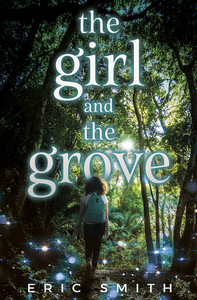Take a photo of a barcode or cover
I received an ARC of this book in exchange for my honest opinion.
The Girl and the Grove is a heartfelt book about a girl, Leila, who is adopted and lives with seasonal affective disorder.
Leila is a big environmental activist, and when she learns that a hidden grove in Fairmont Park is going to be destroyed, Leila and her nature-loving friends fight to prevent the demolition of such a beautiful place.
I really enjoyed how the topic of adoption was handled well in this book. It’s often a hard and heavy subject to accurately convey, especially with the awkwardness of questions people who are adopted are often asked and the inner conflict a person who is adopted must go through at some point in their life.
I also really enjoyed the sense of activism and passion for the environment this book had. Had I been able to read this book when I was younger, I would’ve been more inspired to get involved with such clubs my school offered.
I adored Sarika, Leila’s best friend, who followed her through the system. Sarika is funny, confident, and says it like it is, and I felt that she was a great addition to the story.
One thing that did feel out of place for me, at least when it was initially introduced, is the magic element. I felt that it was introduced a little too late into the story, and would’ve been fine if it was completely removed and Leila did not have any relation to the fantasy creatures she finds in the grove.
Overall, Girl in the Grove is a beautifully written book that artfully handles the strong themes of family, friendship, and trust.
The Girl and the Grove is a heartfelt book about a girl, Leila, who is adopted and lives with seasonal affective disorder.
Leila is a big environmental activist, and when she learns that a hidden grove in Fairmont Park is going to be destroyed, Leila and her nature-loving friends fight to prevent the demolition of such a beautiful place.
I really enjoyed how the topic of adoption was handled well in this book. It’s often a hard and heavy subject to accurately convey, especially with the awkwardness of questions people who are adopted are often asked and the inner conflict a person who is adopted must go through at some point in their life.
I also really enjoyed the sense of activism and passion for the environment this book had. Had I been able to read this book when I was younger, I would’ve been more inspired to get involved with such clubs my school offered.
I adored Sarika, Leila’s best friend, who followed her through the system. Sarika is funny, confident, and says it like it is, and I felt that she was a great addition to the story.
One thing that did feel out of place for me, at least when it was initially introduced, is the magic element. I felt that it was introduced a little too late into the story, and would’ve been fine if it was completely removed and Leila did not have any relation to the fantasy creatures she finds in the grove.
Overall, Girl in the Grove is a beautifully written book that artfully handles the strong themes of family, friendship, and trust.
An entertaining read, lovely characters to follow and a story with potential.
Full review coming soon :)
Full review coming soon :)
We've only got one Earth and she needs some protection from her inhabitants, but that protection gets incredibly personal for one teenage girl in Eric Smith's The Girl and the Grove.
To read this, and other book reviews, visit my website: http://makinggoodstories.wordpress.com/.
Leila's faced challenges her entire life ranging from the emotional stresses of the foster care system, her seasonal affective disorder, and the disembodied voices she occasionally hears and keeps secret from everyone. Having finally been adopted by an accepting and loving couple, Leila's life seems to be settling down, leaving her with ample time to spend with her best friend Sarika and finding ways to help the environment. But the voices in her head are growing louder and more distinct, driving Lelia to find a better solution than ignoring them. By listening to the voices instead, Lelia finds a new element to her environmental cause to lobby for, as well as a surprising insight into her heritage.
This narrative is not only an enjoyable story in a familiar-to-me setting of Philadelphia, but it takes the time to educate readers on some big issues surrounding the lesser discussed topic of adoption, as well as other big topics of identity and the environment, with a dose of magic realism that tempers some of the heaviness of those topics through offering a bit of the fantastic. I found it interesting and refreshing to see the online life of a teenage character that went beyond typical social media through the environmental message board that Lelia and Sarika moderate interspersed throughout the story. Though a common feature in YA books (and books in general), the romantic relationship element of the story was a weak point for me - especially when considering the ages of those involved - but the relationships did serve a purpose in the narrative to help Leila grow as a character and move the story forward.
To read this, and other book reviews, visit my website: http://makinggoodstories.wordpress.com/.
Leila's faced challenges her entire life ranging from the emotional stresses of the foster care system, her seasonal affective disorder, and the disembodied voices she occasionally hears and keeps secret from everyone. Having finally been adopted by an accepting and loving couple, Leila's life seems to be settling down, leaving her with ample time to spend with her best friend Sarika and finding ways to help the environment. But the voices in her head are growing louder and more distinct, driving Lelia to find a better solution than ignoring them. By listening to the voices instead, Lelia finds a new element to her environmental cause to lobby for, as well as a surprising insight into her heritage.
This narrative is not only an enjoyable story in a familiar-to-me setting of Philadelphia, but it takes the time to educate readers on some big issues surrounding the lesser discussed topic of adoption, as well as other big topics of identity and the environment, with a dose of magic realism that tempers some of the heaviness of those topics through offering a bit of the fantastic. I found it interesting and refreshing to see the online life of a teenage character that went beyond typical social media through the environmental message board that Lelia and Sarika moderate interspersed throughout the story. Though a common feature in YA books (and books in general), the romantic relationship element of the story was a weak point for me - especially when considering the ages of those involved - but the relationships did serve a purpose in the narrative to help Leila grow as a character and move the story forward.
I really enjoyed this! It was quirky and heartfelt. Although I'm disappointed it wasn't a portal fantasy (that's definitely the vibe I got from description) and this at times read more like a contemporary, I wasn't disappointed by the story itself. I love anything that touches on saving the environment, and this was a great YA Urban Fantasy to tackle the topic. The adoption angle was the most profound part, simply because you know that is an #ownvoices aspect. I've followed Eric Smith for a few years now and I can see how much family is part of his life. Same goes for Leila here. There were a lot of sweet, heart-warming (or wrenching) moments. This also held a great note of humour. Leila's father, John, in particular really made me giggle. The dynamic between them, and the growth in their relationship was really sweet.
Let me start by saying, this is a very special book for both obvious and not so obvious reasons. First the obvious, this book deals adoption or more to the point, the bridge between being adopted and feeling like you belong to a family. We meet Leila, our main character when she has found herself in a new adopted family. Her anxiety is palatable, you can seriously taste the acrid raw emotions of her past and present experiences as they ooze out of her. The story takes into consideration all the normal adoptive themes; family, identity, place and belonging. This is the obvious part of the story and an important one.
The not so obvious part, the bit that for me is the real WOW factor is the way Leila's energy comes through the pages. How we feel her tight, constrained, contracted life force slowly but surely unwind throughout the cause of the book. This is not always easy to do but Eric does an amazing job. If you pay close attention you can physically feel when Leila lets go, allows the control to slip from her fingers and slips into the space of the unknown.
This book will end up becoming a must-read for adoptees. But I also really encourage those who just struggle with place and purpose to pick this book up and find their own point of understanding in the magic of the Grove.
The not so obvious part, the bit that for me is the real WOW factor is the way Leila's energy comes through the pages. How we feel her tight, constrained, contracted life force slowly but surely unwind throughout the cause of the book. This is not always easy to do but Eric does an amazing job. If you pay close attention you can physically feel when Leila lets go, allows the control to slip from her fingers and slips into the space of the unknown.
This book will end up becoming a must-read for adoptees. But I also really encourage those who just struggle with place and purpose to pick this book up and find their own point of understanding in the magic of the Grove.
3.25/5
There were a lot of things I liked, but the things I didn't seriously irritated me. Pacing was a bit all over the place, and I couldn't stand the mean girl character. I loved the romance though, and our MC was someone I stood behind the entire time!
There were a lot of things I liked, but the things I didn't seriously irritated me. Pacing was a bit all over the place, and I couldn't stand the mean girl character. I loved the romance though, and our MC was someone I stood behind the entire time!
3.75* A lovely exploration of identity and mental health with a touch of magic wrapped in a brilliantly unique story.
This wasn’t at all what I was expecting but it was such a pleasant surprise. I was very much here for having a cast of characters so passionate about the environment and absolutely loved seeing SAD represented, as it’s something I’ve not seen discussed in fiction before.
I instantly warmed to the characters and the multiple relationships explored but I’m not sure I totally got on with the writing style. There were a few spelling mistakes and oddly structured sentences here and there, which did pull me out of the story at times but overall, this was a heartwarming, original, easy and thoroughly enjoyable read.
This wasn’t at all what I was expecting but it was such a pleasant surprise. I was very much here for having a cast of characters so passionate about the environment and absolutely loved seeing SAD represented, as it’s something I’ve not seen discussed in fiction before.
I instantly warmed to the characters and the multiple relationships explored but I’m not sure I totally got on with the writing style. There were a few spelling mistakes and oddly structured sentences here and there, which did pull me out of the story at times but overall, this was a heartwarming, original, easy and thoroughly enjoyable read.
I have to start by saying this book was unlike anything I’ve read before. I feel like it’s best not knowing much about it before you jump in, because a lot could spoil key points to the story. While there was significant character development, I would consider this one more plot driven.
Leila and Sarika were such fun characters, I loved their interactions and how genuine they seemed. Their banter back and forth made me laugh, as much as their sweet personal moments made my heart swell. I would absolutely want a best friend like Sarika in my life. The fact that they overcame so much was admirable and just made me love them even more. Leila’s adoptive parents were wonderful, I loved all the scenes where they interacted.
If you are looking for a different type of contemporary read, with gorgeous writing, look no further. I have to mention the fantasy parts of the books aren’t super prominent (maybe because I’m an avid fantasy reader), but there is some element of fantasy. The only slight issue I had with it was that the story seemed to unfold extremely fast, I wasn’t the biggest fan of the pace.
Leila and Sarika were such fun characters, I loved their interactions and how genuine they seemed. Their banter back and forth made me laugh, as much as their sweet personal moments made my heart swell. I would absolutely want a best friend like Sarika in my life. The fact that they overcame so much was admirable and just made me love them even more. Leila’s adoptive parents were wonderful, I loved all the scenes where they interacted.
If you are looking for a different type of contemporary read, with gorgeous writing, look no further. I have to mention the fantasy parts of the books aren’t super prominent (maybe because I’m an avid fantasy reader), but there is some element of fantasy. The only slight issue I had with it was that the story seemed to unfold extremely fast, I wasn’t the biggest fan of the pace.
The Girl and the Grove is a fresh take on a popular fantasy narrative--The Chosen One--while also depicting everyday contemporary life in such a way as has rarely been seen in Young Adult up to this point.
Read the full review on my blog!
Read the full review on my blog!
This is such a delightful book! Smith makes good use of social media in the narrative, and the characters are compelling and fit with each other. Also, if you're looking for a good YA that talks about environmentalism, you should read this!







